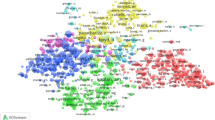Abstract
Contemporary methodological approaches to research of the information society are analyzed in this article. Postmodernism and the information approach are compared as tools for explaining the contemporary social reality. The shaping of innovative social practices in the contemporary social information space is substantiated.
Similar content being viewed by others
References
Lopatina, N.V., Sociology of informatization management: Methodological status and positions in structure of contemporary sociology, Vestn. Mos. Gos. Univ. Kult. Isskusstv, 2008, no. 3, pp. 78–83.
Lopatina, N.V., Informatization in the Context of Social and Cultural Trend Research, Observatoriya kul’tury, 2008, no. 5, pp. 16–20.
Sladkova, O.B., Philosophy of postmodernism and contemporary communication regime, Nauchnoe, ekspertno-analiticheskoe i informatsionnoe obespechenie natsional’nogo strategicheskogo proektirovaniya i programmirovaniya. Trudy Vserossiiskoi nauchno-prakt. konferentsii. Ch. 2 (Proc. All-Russ. Sci.-Prac. Conf. “Scientific, Expert-Analytical and Information Assurance of National Strategic Design and Programming. Ch. 2), Moscow: INION, 2009.
Sladkova, O.B., Social-information technologies as the tool of analytics in the process of study of sociocultural medium, Vestn. Akad. Ekonom. Bezop. MVD Rossii, 2011, no. 1, pp. 154–159.
Slyadneva, N.A., Social-information technologies as synergetic factor of social management, in Sotsial’noinformatsionnye tekhnologii: problema dvoinogo naznacheniya. Analitiko-prognosticheskie issledovaniya: v 2-kh ch. Ch. 1 (Social-Information Technol.: Problem of Twofold Purpose, in 2 books. B. 1), Slyadneva, N.A., ed., Moscow: Mos. Gos. Univ. Kult. Isskusstv, 2004, pp. 9–17.
Slyadneva, N.A., Information civilization — problems of social cybernetics and cyberethics, Uchenye Zapiski Mos. Gos. Univ. Kult. Isskusstv, 2003, no. 25, pp. 80–96.
Slyadneva, N.A., Information-creative cycle as condition of society anticrisis development, Uchenye Zapiski Mov. Gos. Univ. Kult. Isskusstv, 2001, no. 23, pp. 5–25.
Slyadneva, N.A., A human of information epoch — Homo informaticus, Nauchno-Tekhn. Inform. Ser. 1, 1999, no. 3, pp. 9–13.
Slyadneva, N.A., Information antropology of new world: Problems of intellectual evolution of information epoch human, in Kul’turologiya: Novye podkhody: Al’manakh — Ezhegodnik, no. 12 (Culturology: New Approaches: Annual Anthology, no. 12), Moscow: Izdatel’skii Dom Mos. Gos. Univ. Kult. Isskusstv, 2006.
Slyadneva, N.A., Contemporary technologies of information operation: Prosperity or collapse of creative? Information. Telekommun. Tekhnol., 2007, no. 2, pp. 51–56.
Slyadneva, N.A., Civil society and information society: The problem of coevolution, Inform. Resursy Rossii, 2009, no. 2, pp. 2–6.
Author information
Authors and Affiliations
Corresponding author
Additional information
Original Russian Text © N.A. Slyadneva, 2014, published in Nauchno-Technicheskaya Informatsiya, Seriya 1, 2014, No. 5, pp. 3–7.
About this article
Cite this article
Slyadneva, N.A. Social practices in the era of the information society. Sci. Tech.Inf. Proc. 41, 98–102 (2014). https://doi.org/10.3103/S0147688214020105
Received:
Published:
Issue Date:
DOI: https://doi.org/10.3103/S0147688214020105




